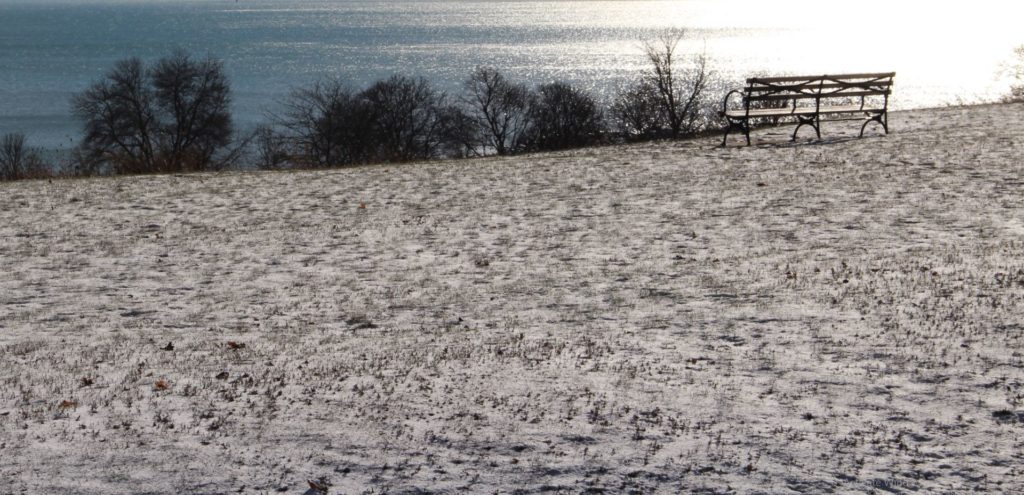One of the many reasons I was delighted to move to Milwaukee from South Florida was that I missed the four seasons. Here in Milwaukee we certainly have the full spread of seasons. Sometimes it feels like we have all four even in one week!
As I write this Dvar Torah, I look out the window and I see a blanket of sn
ow upon the ground and I am always amazed at the extraordinary beauty of the white fresh snow on the trees replacing the multi-colored leaves of fall. Most people that hear me talking about this roll their eyes. Winter isn’t everyone’s cup of tea; and to be perfectly honest by February I’m not always sharing my love of the snow, ice and cold. The days are short, the darkness long. We awake and slumber without the light. The autumn leaves are crumbled and decay below the surface. For some this is a reflection of their internal world. Many feel they are spiritually in darkness and that the light feels far too distant to grasp.
It is amidst the darkness, cold and snow that we transition from the close of Breishit (Genesis) to the beginning of Shmot (Exodus). Our people had reached an apex at the end of Breishit through Joseph’s mastery of dreams. Joseph was so proficient with dreams that he envisioned a future for himself and for his family and he had the Seychel to make those dreams a reality. Now as we begin Shmot we read, “A new king arose over Egypt, who did not know Joseph.” (Chapter 1:8) Like leaves falling from a tree the generations following Joseph had passed into the eternal and now these words, “who knew not Joseph…” indicate a change of season. Like seeing a first snow flake fall from the sky, only to be followed by many others, darkness fell upon our people. Our lives were restricted. Our future was uncertain. Our flourishing was a distant memory.
The story of our enslavement is a profoundly difficult one. When we retell the events of our degradation, our despair and our lack of options and choices, we feel the pain of those who walked before us. It is not so unlike looking out of our window in January and seeing a loss of light; a feeling of coldness that permeates our very being. And yet I cannot stop thinking about how lovely it can be outside and at the same time I cannot stop feeling hopeful as I read the story of our prior enslavement.
Here’s why. Seemingly out of place, amidst the blustery winter in Wisconsin we commemorate the minor festival of Tu Bishvat. In the land of Israel it was the date on the calendar in which farmers established when they should bring their fourth-year produce of fruit from recently planted trees to the Temple as first-fruit offerings. Sitting amidst the snow it seems a stretch to connect to a festival about trees, but in a reality it comes at a time in which we need it most. There is a modern Tu Bishvat tradition that I find profoundly meaningful. At the end of the Tu Bishvat Seder, we plant a single parsley seed. We place it by the light, we feed it with soil and water and day by day we watch that parsley grow. Through the remaining winter months we wait as the seed begins to sprout, and we watch as it peeks its stem through the darkness and reaches for the light. We do this so that as we gather by our tables as families and communities during Passover, we might use that parsley to dip into the salt water; symbolic of new life amidst the tears.
When we finally emerge from Egypt, we experience a rebirth as a new nation. We enter into the spring of our people’s epic national story and we retell it every year according to the cycle of our lives. It is ever new and it is always relevant.
Many of us experience hardships in our lives. Hardships come in the summer just as they do in the winter. At any given time we may feel that we are in darkness, but our tradition teaches us not to despair, for there is always a reason to hope. There is always a seed that sits in the dark soil that has the potential to emerge into the light; there is always the promise that lies beneath the snow that fills me with a sense of wonder. As we spend the remaining winter together; as we read the stories of our people’s challenges, as we confront the hardships in our lives, may we always remember the lessons of our people, that nascent life and rebirth is just around the corner, with the promise of a new spring.
Rabbi Noah Chertkoff is senior rabbi at Congregation Shalom in Fox Point.


